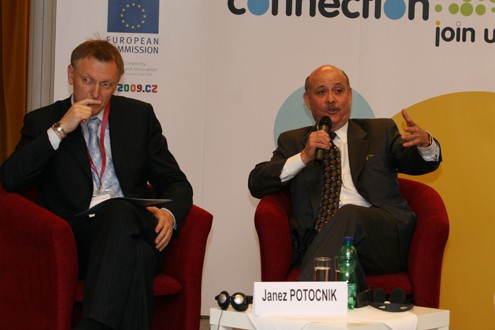
Revolutionary thinker: Jeremy Rifkin (right) with European research commission Janez Potocnik
By Matin Durrani
I can’t say I was hugely inspired by the opening address here in Prague at the Research Connection conference by European Commission science and research commissioner Janez Potocnik.
There was lots of hot air about “synergy leading to new quality”, “capacity building”, “structural and cohesion funds” and “community instruments”. I almost fell asleep.
To be fair to the Slovenian former economist, he admitted that while the conference features some top speakers, he wasn’t sure “it is polite to include myself in this category”. Refreshing honesty from a politician.
Much more interesting was the main plenary address on sustainable energy by Jeremy Rifkin, president of the Foundation on Economic Trends and advisor to the European Union. He’s also head of a group of 100 industrial bosses committed to “address the triple challenge of global economic recovery, energy security and climate change”.
So clearly a guy with fairly small ambitions.
In a doom-laden first half of his talk, Rifkin warned how too many politicians have completely underestimated how bad climate change will be — his talk was of anything up to 70% of species going extinct, oil supplies peaking within the next decade, and plenty of floods, storms and disaster.
Thankfully Rifkin has a solution — distributed energy.
Just as the computing Grid can carry out massive calculations by farming out chunks of processing to individual computers around the world, so distributed energy would involve individual houses and factories generating electricity using solar panels and wind turbines.
It’s revolutionary stuff — gone would be big, centralized oil-, gas-, or nuclear-powered stations. In would be small scale production, distributed around the world.
Better still, if it works, the idea is that people would sell unused energy to other people connected to the Grid.
It’s what Rifkin calls the “third industrial revolution”.
I was interested that Rifkin reckons the European Union is at the forefront of this idea — he hopes the EU will champion it at this year’s Copenhagen climate-change conference — whereas the US is still more resistant to it.
But as he pointed out at a later press conference, Obama has twigged what he’s on about and once the US sets itself a challenge, it could end up implementing distributed energy much faster than Europe’s fragmented nation states could.
Rifkin’s a polished performer and a man for the soundbite. Potocnik – take note. It might get you noticed.
Right, where’s that solar cell…



